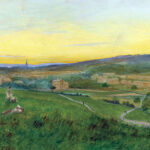30 July 1825: The Bridlington bellman Dickey Fletcher cries two keys found on the resort’s North Sands
William Hone. 1827. The Table Book of Daily Recreation and Information, Vol. 1. London: William Tegg. Get it:
.Unedited excerpt
If an excerpt is used in the book, it will be shorter, edited and, where applicable, translated.
DICKEY FLETCHER.
To the Editor.
I hastily transcribe the following, originally written for the Hull Advertiser, and printed in that paper for September 27, 1827, and subsequently in some of the London and provincial newspapers.
On Saturday, September 22, 1827, the inhabitants and visitants of Bridlington Quay, by a fatal accident, were suddenly deprived of the services of Richard Fletcher, the facetious and well-known bellman of that place, whose singular appearance, rhyming propensity, peculiar manner of pronunciation, and drawling and general originality, have so long been a source of amusement. In the forenoon of the above-mentioned day he was following his usual vocation, with that accustomed gaiety and cheerfulness for which he was remarkable, when having occasion to call at the lodging-house of Mr. Gray, he accidentally fell down the steps of a cellar-kitchen and broke his neck. The death of “poor Dickey,” and the shocking manner in which it occurred, excited much commiseration. The deceased was seventy-nine years of age, and left a widow at the age of eighty-nine, the relict of a former bellman, to whom he had been united about four years – during which period the antiquated pair formed a striking pattern of attachment. Dickey was a freeman of Hull, and the manner in which he made up his mind to vote for a candidate is deserving of mention. In the event of a contested election he was uniformly for the “third man;” as, he would say, “the other two would not think of looking after me, but for him.”
A specimen of Dickey’s rhyming eccentricities appeared in the Hull Advertiser of August 5th, 1825; a copy of which, and the paragraph accompanying it, is here given:-
“The company at Bridlington Quay are often highly amused by that eccentric little creature, yclep’d ‘the bellman.’ He is quite a lion; – being a poet as well as a crier. His poetry is uncommonly original and if his pronunciation, when improvising, be not so too, it is uncommonly Yorkshire, which is as good. The following lines are a very faithful imitation of the ‘cry’ this singular-looking being drawled forth on Saturday morning, July 30:-
“Tack’n oop this forenoon apod noarth sans
Two keyes, wich I ev i’ my ans;-
Wo-hever as lost ‘um mus coom te mea,
An they sal ev ‘um agean an we can agrea.’”
“Dickey’s late marriage was one of the ‘largest and the funniest’ known in Bridlington for a long time; a barouche and pair were gratuitously provided on the occasion, as well as a wedding-dinner and other et cæteras. Since ‘they twain became one flesh,’ Dickey has been very proud of walking abroad, at fair times and public occasions, with ‘his better part,’ when they generally formed objects of considerable attraction to those to whom they were not particularly known.”
T. C.
Bridlington, October, 1827
Comment
Comment
Something to say? Get in touch
Similar
Comment
Comment
Something to say? Get in touch
Search
Donate
Music & books
Place-People-Play: Childcare (and the Kazookestra) on the Headingley/Weetwood borders next to Meanwood Park.
Music from and about Yorkshire by Leeds's Singing Organ-Grinder.



 Bluesky
Bluesky Extwitter
Extwitter